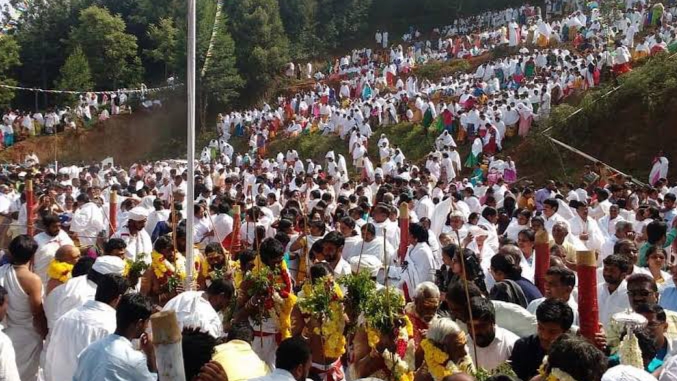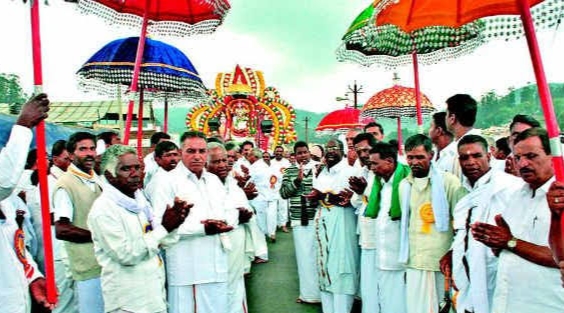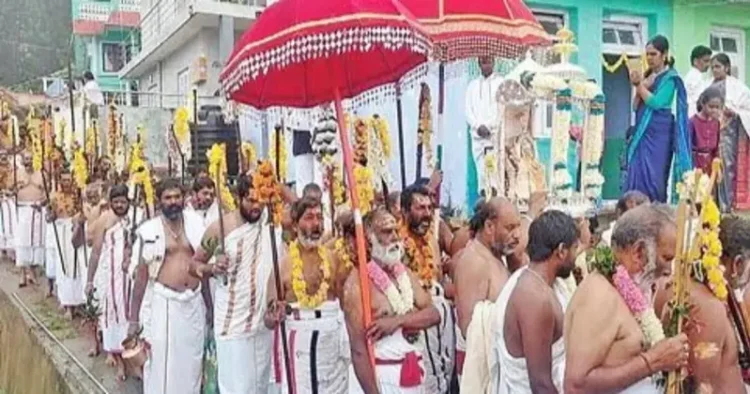In the picturesque hills of the Nilgiris, the Badagas tribal community annually celebrates the Hetthai Amman festival, a vibrant and sacred 8-day event known locally as “Hebba.” This festival, deeply rooted in the cultural heritage of the Badagas, draws visitors from across the globe and locals seeking to witness the unique rituals, traditional attire, and religious fervour.

The Hetthai Amman festival holds immense cultural significance for the Badagas, an indigenous social group residing in the Nilgiri district for nearly two centuries. It centers around the worship of Goddess Hetthai Amman, their ancestress.
The 8-day festival, Hebba, unfolds with fervent prayers, offerings, and traditional dances. It begins on the first Monday following Pournami (Full moon day) but doesn’t adhere to a fixed date, aligning with the auspicious day in the Tamil month of Margazhi.
Participants, predominantly men, don traditional white attire comprising a turban, Mundu, Mandarae, and Badagaru Seele. The men carry a sacred family stick called Dhadi during the procession to the Hetthai Amman temple.

An age-old tradition called Kanikai involves collecting offerings of twenty paise coins (now replaced with one rupee coins) from every household. These offerings are then tied in a white cloth and presented to the Hetthai Amman temple at Berangani.
According to Senthil Kumar of Coonoor, there are 18 divisions of Badagas in Nilgiri district. They moved to this place during the rule of Tipu Sultan, Hyder Ali in the neighbouring Karnataka. They have made this place their residence since then (nearly 200 years). They can be found in Gudalur, Coonoor, Ooty , Kothagiri and surrounding areas. Of the 18 divisions, udhaya, Aruva Athigari, Badaga, Kanaga, Turya, are notable among them. Their family deity is Hetthai amman which is located near Kothagiri.
The festival includes a grand procession to Hetthai Mane, accompanied by the chanting of “Ye Ha Ho” by the Badaga Athikkodu. Women spread white sheets on the procession path, and blessings are bestowed on those who did not participate.
The sacred Dhadi stick is meticulously kept in Hagottu, a sacred corner within the kitchen, throughout the year. Men alone are permitted in this space, where dairy products are stored. The stick is taken out only once a year for the festival.
The Badagas are known for their adherence to a strict code during the festival, abstaining from alcohol, smoking, and non-vegetarian food. A community feast, or Anna dhan, is organised, utilising crops and produce from Badaga agriculture.
The Badagas boast an 80 percent literacy rate, with many engaged in government jobs and some working abroad. Despite cultural festivities, the community maintains a focus on education and professional pursuits.
The grandeur of the Hebba festival attracts tourists from around the world, especially during the Christmas vacation. Visitors from neighboring districts also flock to Nilgiris to witness and partake in the cultural richness. The highlight of the festival is the rare glimpse of Goddess Hetthai Amman, shown to the public for a few seconds during the festival. It adds to the sanctity and importance of the event for the Badagas.
The Badaga community comes together not only during festivals but also for various events such as marriages and funerals, maintaining strong social bonds.
As the Hetthai Amman festival concludes, it leaves an indelible mark on the Nilgiris, showcasing the Badagas’ commitment to preserving their cultural identity. The festival becomes a testament to the harmonious blend of tradition, spirituality, and modern pursuits within the Badaga community, making it an enriching experience for participants and observers alike.




















Comments